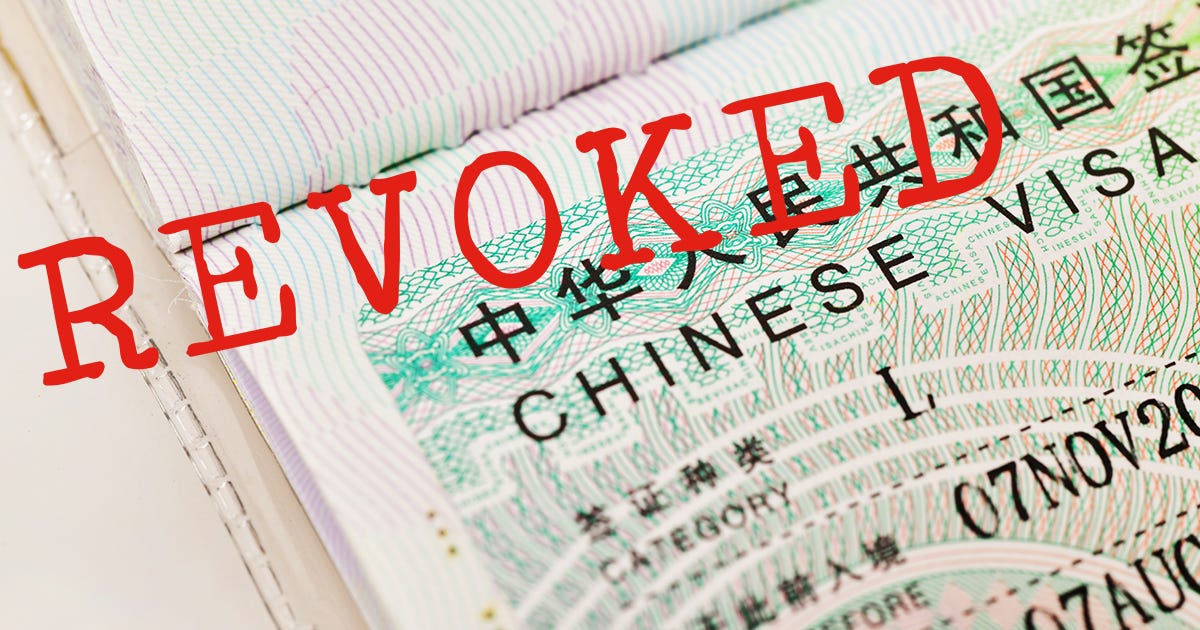Come In, You’re Free to Stay Forever
The Strategic Logic of Beijing’s Exit Ban Economy
"For anyone in China, whether Chinese or foreign, they need to abide by Chinese law."
- Chinese Foreign Ministry spokesman, responding to an American banker being blocked from leaving the country.
Beijing wants this to look like business as usual. Just laws being laws, applied equally. But when a Wells Fargo banker can't board her outbound flight because of an unspecified "investigation," we’re no longer talking about risk: we're talking about strategy.
While Chinese officials publicly roll out the red carpet for foreign capital, behind the scenes they're tightening the net. Exit bans are no longer rare. They are doctrine in motion.
If you're a company doing business in China - or still thinking about it - you’re walking into a strategically constructed trap. And if you're a US policymaker? The trap isn't just for corporations. It's a wedge into national security itself.
More Than a Contradiction, It's the Playbook Now
Beijing says: "We welcome investment." Beijing means: "Your capital is now leverage."
Foreign executives are supposed to believe China wants win-win cooperation. In truth, China wants to absorb your know-how, shape your behavior, and hold your operations hostage if necessary.
This isn't confusion; it's statecraft with Chinese characteristics, grounded in doctrines like Unrestricted Warfare and the CCP's evolving legal warfare model. Under Xi Jinping's comprehensive national security framework, economic relationships aren't partnerships. They're operational terrain.
The strategy is clear: invite investment, create dependency, weaponize entanglement. What the West calls regulatory uncertainty, Beijing sees as operational control.
How the Trap Works
Phase I: The Lure
The invitation is compelling: preferential terms for "pilot zones," green energy hubs, EV supply chains. Speeches in Shanghai promise "transparency" and "openness." High-level photo ops with smiling Chinese officials and American CEOs reinforce the illusion of partnership.
But the actual hook isn't access; it's advantage. Tax incentives, special economic zones, and fast-track approvals make China irresistible compared to emerging markets. The setup is classic: high reward, hidden cost.
Phase II: The Embedding
Once committed, foreign firms must share IP, localize data, and embed deep in Chinese systems. Cybersecurity inspections double as intelligence collection. Routine compliance becomes strategic exposure.
Laws are interpreted broadly and enforced selectively. "State secrets" can include quarterly earnings or market research. The regulatory environment tightens slowly, but deliberately. The deeper the investment, the more complex the disentanglement.
Phase III: The Trap
Tensions rise, or Beijing needs leverage, and the trap closes. Exit bans. Retroactive tax audits. National security charges based on routine diligence. Dawn raids on firms like Mintz and Bain.
What was once a lucrative venture becomes a source of diplomatic risk. Even compliant firms can become hostages to Beijing’s shifting priorities.
Indicators of Further Escalation
Senior G7 execs (VP+ level) targeted to increase diplomatic pressure.
Exit bans justified via civil litigation or commercial disputes.
National security laws applied to audits and operational oversight.
Coordinated state media coverage before or during detentions.
Focus on foreign nationals in state joint ventures and sensitive sectors.
Beijing is no longer experimenting. It is institutionalizing this playbook.
Sector-Specific Risk Snapshots
Electric Vehicles & Green Tech: Tesla's Shanghai Gigafactory was supposed to be a model of US-China cooperation. Instead, it became a masterclass in technology absorption. Chinese competitors learned from Tesla's manufacturing processes, supply chain management, and battery technology. Now China exports the world's cheapest EVs powered by supply chains and expertise originally provided by foreign partners.
The green tech sector faces particular vulnerability because Chinese dominance in critical mineral supply chains creates natural chokepoints.
Finance: BlackRock, MSCI, and Vanguard were drawn in by market access. Now they face US sanctions exposure and PRC legal risks. Wells Fargo's exit ban incident is the new frontier: individuals as leverage.
Semiconductors & Advanced Tech: Joint ventures lead to IP transfer. Local staff face legal scrutiny or travel bans. Over time, foreign tech becomes domesticated under state control.
Platforms & Data: The 2023 Anti-Espionage Law makes handling data a liability. Cybersecurity probes become routine. If your servers touch Chinese soil, your data belongs to the Party. Just ask Didi.
Why US Business Misreads the Threat
Western firms frame China risk as commercial, encompassing regulatory hurdles, legal uncertainty, and reputational fallout. In reality, they’re operating on a geopolitical chessboard, not a commercial spreadsheet.
Strategic entanglement ≠ strategic engagement. It's the creation of leverage, cloaked in contracts and market incentives.
National Security Spillover
US companies lobby against sanctions or export controls because of exposure.
Leaked IP or talent supports PRC's military-civil fusion strategy.
Capital flows legitimize PRC actors working to undermine the international order.
Executives become a human lever in diplomatic standoffs, limiting the US government’s flexibility in crises.
Quarterly wins can generate decade-long vulnerabilities.
Strategic Recommendations
For Firms:
Conduct "coercive exposure audits": Where and how could China trap your people, data, or assets?
Build exit plans: For assets, capital, staff, and technology.
Re-risk intelligently: Don’t just decouple; diversify into jurisdictions where leverage is lowest.
For Policymakers:
Mandate transparency: Require disclosure of PRC legal and regulatory exposure in public filings
Tie outbound investment to national security: Restrict capital flows that aid PRC strategic sectors
Insure orderly withdrawal: Build coalitions and insurance mechanisms for rapid, collective exit; not bailouts of captured firms
The Bottom Line
Beijing doesn’t want genuine partnerships. It wants presence: foreign, vulnerable, and valuable on its own terms.
When a foreign banker is blocked from leaving China, it’s not a misunderstanding; it’s a message.
If you invest in China without understanding the strategy, you’re not just risking your capital; you’re becoming part of the scaffolding for someone else’s power.
Got a strategic question or idea worth exploring?
I welcome sharp questions, under-examined angles, and future-post suggestions. Email me directly: inquiries@xinanigans.com




